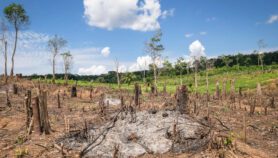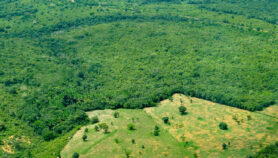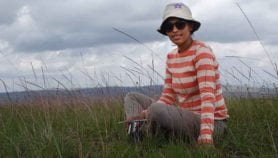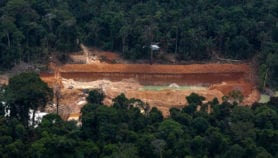Send to a friend
The details you provide on this page will not be used to send unsolicited email, and will not be sold to a 3rd party. See privacy policy.
Below is a round up of news from or about Sub-Saharan Africa for the period 10–26 September 2007.
New book details Africa cancer fight
In his new book Senegalese oncologist Adam Ly says that by 2020 as many as one million new cancer cases will occur in Sub-Saharan Africa annually. ‘About Cancer in Africa’, containing contributions from 136 researchers from 32 different countries, is intended as a working tool for medical staff and radiologists in Africa. More>>
Ghana landscape changing, say researchers
A satellite survey and fieldwork by the University of Ghana and partners has found that agriculture, opencast mining and the deliberate burning of woodlands for timber had drastically altered the country’s ecological zones since 1972, reducing forests and increasing cropland. The study also found that forest cover in Niger improved after the government implemented science-based recommendations. More>>
Improving African cassava crops
A team, including researchers from Nigeria’s National Root Crops Research Institute, found that the starch-rich African staple cassava could be greatly improved by cross-breeding with varieties from Latin America. The research, published in Crop Science, says 14 varieties with high yields and resistance to mosaic disease are at advanced stages in the African breeding programme. More>>
Open AIDS patients report violent abuse
People who disclose their HIV positive status receive extensive physical and verbal abuse and neglect, according to 43 focus groups in Lesotho, Malawi, South Africa, Swaziland, Tanzania and Zambia. Lead author Priscilla Dlamini says the research, published in Public Health Nursing, suggests healthcare workers who encourage people to be open must consider the negative implications. More>>
Kenya aiming to be middle-income by 2030
Kenya has announced 20 projects as part of its aim to be a middle-income country by 2030. Planning minister Henry Obwocha said the proposals include 24 new dams in arid regions, 28,000 new teachers, 560 new secondary schools with a focus on information technology skills, cheaper and locally manufactured fertiliser for farmers and a free trade port. More>>
Ugandan curriculum ‘must include science earlier’
Uganda’s education department has been urged to revamp the country’s curriculum to include science and technology at an earlier stage. Peter Ndemere of Uganda’s National Council for Science says science had to be ”demystified” and university courses made more appropriate to changing economic needs. More>>
Mozambicans unaware of mental health medical treatment
Increased investment in mental health resources and closer work with traditional healers in poorer regions is an urgent need, according to a study in The Lancet. Psychosis, mental retardation and seizures — all more common in rural than in urban settings — were frequently attributed to supernatural intervention, says the research, commissioned by Mozambique’s Ministry of Health. More>>*
Seniors’ depression ‘overlooked’ in African health policies
The urban elderly in sub-Saharan Africa are at significant risk of depression — including suicidal impulses — according to research in Nigeria, one of the poorest and rapidly-urbanising countries in the world. Oye Gureje, lead author of the Lancet research, said more than 65 per cent of people identified as lifelong depressives had never received treatment. More>>*
Benin residents ‘should stick to traditional menus’
Traditional diets are healthier, according to a study of adult eating habits in Benin. The research, published in the European Journal of Clinical Nutrition, suggests that urban-born and upper-income adults — most likely to consume a more Westernised, high-fat and high-sugar diet — face greater risk of chronic lifestyle diseases. More>>
Ivorian researchers develop better shea nut butter
Researchers from Côte d’Ivoire have developed an improved form of shea butter — used across Africa for everything from chocolates to moisturiser — raising the possibility of greater commercial manufacture. They report in the African Journal of Biochemistry Research that the lab-made butter was also free from heavy metals, salmonella bacterium, faecal pathogens, yeast and mould — all found in local market makes. More>>
*Free registration required













